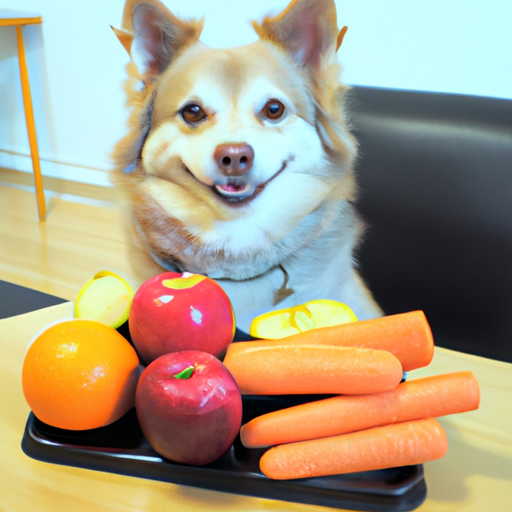As a caring and responsible pet owner, you always want to ensure your furry friend is getting the best nutrition possible. But when it comes to what table foods can dogs eat, it can be a bit of a minefield. That’s why we’ve put together this comprehensive guide to help you navigate through the do’s and don’ts of feeding your dog table food.
1. Fruits and Vegetables
These can be a fantastic source of vitamins and minerals for your canine companion, but it’s important to know which ones are safe:
| Safe for Dogs | Unsafe for Dogs |
|---|---|
| Carrots | Grapes |
| Apples | Avocado |
| Blueberries | Onions |
| Peas | Garlic |
| Cucumber | Cherries |
Remember to always remove any seeds or pits before feeding fruits to your dog, and it’s always best to serve them in small, manageable pieces to prevent choking.
2. Meats and Protein
Dogs are natural carnivores, so it should come as no surprise that they can benefit from consuming certain types of meat:
- Chicken: This is a great source of protein, but make sure it’s cooked and boneless.
- Fish: Salmon and tuna are packed with beneficial omega-3 fatty acids, but again, ensure it’s cooked and boneless.
- Eggs: These can be a great source of protein, but they should always be fully cooked.
3. Dairy Products
Not all dairy products are created equal when it comes to feeding your dog:
- Cheese: Small amounts can be a tasty treat for many dogs, but be aware that some may be lactose intolerant.
- Yogurt: This can be a source of probiotics, but ensure it’s plain and not loaded with sugar.
- Milk: Many dogs are lactose intolerant, so it’s best to avoid giving them large amounts of milk.
4. Grains
Certain grains can be a good source of fiber for your pooch:
- Rice: This is easy to digest and can be a good choice for a dog with a sensitive stomach.
- Oats: These provide a number of important nutrients, including fiber and vitamins.
- Quinoa: This is considered a ‘superfood’ and can be a healthy addition to your dog’s diet.
5. Treats and Snacks
Treats should make up no more than 10% of your dog’s daily caloric intake. Here are some safe options:
- Peanut Butter: This is a great source of protein and healthy fats, but make sure it does not contain xylitol, a sweetener that can be toxic to dogs.
- Popcorn: This can be a fun treat, but only offer it plain and fully popped.
FAQ
Q: Can I give my dog chocolate?
A: No, chocolate contains theobromine which can be toxic to dogs.
Q: What about bread?
A: In small amounts, bread is safe for dogs. However, it doesn’t offer much nutritional value.
Q: Is it okay to feed my dog table scraps?
A: While some table foods are safe for dogs, it’s important to ensure they’re getting a balanced diet. Regularly feeding them table scraps can lead to weight gain and other health problems.
Q: Can dogs eat nuts?
A: Some nuts, like cashews and almonds, are safe in small amounts. Others, like macadamia nuts, are toxic.
Q: What should I do if my dog eats something toxic?
A: If you suspect your dog has ingested something harmful, contact your vet immediately.



